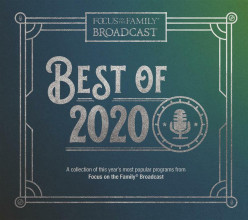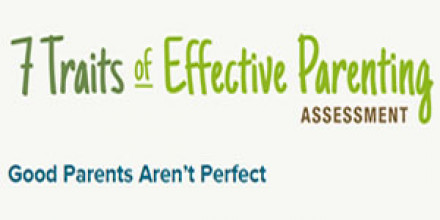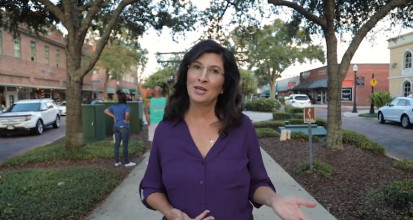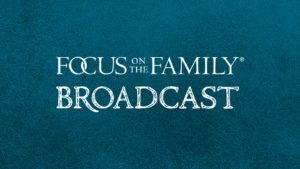John Fuller: Welcome to another best of 2020 episode of Focus on the Family, in which we have some help for navigating the teen years.
Excerpt:
Connie Albers: And I just laid my head on the pillow that night. I was just crying, and I said, Lord, get me out of the way so that I am not the obstacle to him hearing your voice because that’s really what he needed.
End of Excerpt
John: Your host is Focus president and author Jim Daly. And I’m John Fuller.
Jim Daly: John, when you first become a parent, you envision having a close-knit relationship with your children as they get older. You picture deep talks you’ll have with them about God and relationships. And then the teen years hit. And so often it’s hard to maybe even get along, let alone have that meaningful conversation.
John: Yeah, you’ve mentioned the one syllable responses we can often get. A lot of families experience at least some turbulence during those adolescent years, whether it’s a conflict over the rules or navigating teenage mood swings. And fortunately, most of that’s behind us for our six kids and we’ve survived. And I just want to say to parents, you can, too.
Jim: Well, teenagers are great at pushing those buttons and it’s hard to show grace sometimes. If this is you or the teen years are coming up around the corner, we have some really practical help for you. Today we’ll be revisiting a conversation we had with Connie Albers, which was one of our most popular broadcasts this year. She covered some important groundwork, all about connecting with your children during the ups and downs of the teen years.
John: And Connie’s book is called Parenting Beyond the Rules: Raising Teens with Confidence and Joy. And you can get your copy at focusonthefamily.com/broadcast or when you call 800-A-FAMILY. And here’s how that conversation with Connie Albers began on this Best of 2020 episode of Focus on the Family.
Jim: Connie, welcome to Focus on the Family.
Connie: Thank you so much for having me. It’s a delight to be with you.
Jim: Are you kidding? We’re desperate. We needed you. (LAUGHTER)
Connie: Hey, in this culture, right? (Laughter).
Jim: It’s really good to have you here, Connie. We’ve got 14 questions we want to ask you.
John: First, you, Jim, then me.
Connie: Well, we have a lot to talk about. (LAUGHTER)
Jim: No kidding! But let’s start with the title – Parenting Beyond the Rules. OK. Some are going, “Finally. That sounds so good.” And then others, maybe some dads – “What? How can you parent without rules?”
John: Rules are good.
Jim: But you’re not saying that.
Connie: That’s right.
Jim: So, describe what you’re saying there – parenting beyond the rules.
Connie: Right. You know, I do get that. “Does that mean, Connie, that you don’t have any rules?” I’m like, “No.”
Jim: Please because that would be a lot easier! (LAUGHTER)
Connie: Um, it’s like, no. It’s not that we don’t have rules, limits and boundaries. We do have rules, limits and boundaries. However, the goal is to raise children who want to have a relationship with us.
Jim: Why do we miss that? Uh, we talk about that a lot on the program now. I think Christian households – when we have, I mean, Ph.D. therapists in here and we’re talking about this, it’s one thing to believe that; it’s another thing to do it.
Connie: Yeah. Living it out is hard. Part of it is control. I mean, when the children are younger, what do we do? We tell them exactly what we’re gonna do, when we’re going to do it, how we’re going to do it. But then, all of a sudden, they don’t want to do it like that anymore. (Laughter) You make them the French toast for breakfast, their favorite meal, and they wake up and they go, “I don’t like French toast.” “What? But that’s your favorite meal.” “I don’t like it.” And – and you’re sitting there thinking, “What is going on? I made your favorite thing. You’re so ungrateful.” And you end up into this power and control, and it’s not about control. It’s just about – I think you said it earlier. John, you said, your wannabe 16-year-old – they want to grow up. And they’re sometimes thrashing and flailing around. Like, you mentioned the white water. I just view it as, you know, everybody’s in the boat, and you’re paddling as hard as you can. And some of them want to jump out, and the others fall out, but we’re still trying to reach them and throw them back in the boat…
Jim: No. It’s so true.
Connie: …So that we can get there.
Jim: Yeah. That’s the key.
Connie: So that’s the whole purpose is – I really want parents to have a relationship and realize that we make the rules, the limits and the boundaries; we can adjust them.
Jim: Yeah. Let me – let me push on this a bit.
Connie: OK.
Jim: Uh, that cheerleading comment is an interesting one to me. Is cheerleading freely given, or is it earned?
Connie: Oh, absolutely not earned. It’s freely given!
Jim: OK. I just want to make sure parents are hearing that.
Connie: Oh, no!
Jim: Because again, temperaments play into this. Some parents are wired a different way. And you’re going to get my cheers when you earn my cheers.
John: Yeah. Otherwise, it feels artificial.
Jim: And that becomes a very conditional environment, that your kids all of a sudden learn, if I dance the right way then mom and dad – or mom or dad like me or love me.
Connie: And that – the child that’s given toward people-pleasing, those become the children that are easiest to raise because they know exactly what the standard is. And they know what to say and how to say it. But the child who is more of your adventurer, your risk-taker, your leader…
Jim: Strong-willed.
Connie: Your leader…
Jim: Strong-willed – yeah.
Connie: And see, strong-willed – I just think that’s a future leader who just…
Jim: Yeah.
Connie: …Needs to be guided.
Jim: Right. No, I agree with that.
Connie: And so when we – when we think about how we’re working with them in that capacity, I have to step back and say to the mom and dad, “If you know why you’re doing it and where you’re going,” which, hence the vision casting – I tell parents that, “When you’re sitting there and you’re thinking about in your own mind, where are you trying to go?” – like, I did not come from a great upbringing, so for me, I did not want to repeat history. It wasn’t that, um – I love my family. It’s just that I knew there had to be a better way.
Jim: But hang on because you had an awareness there. And some people with their childhood and the things they learned in their family of origin, there’s not that awareness. And actually, they can tend to repeat the errors of their father.
Connie: That is true.
Jim: And so, you’re stricter, you’re harsher, you’re – and that’s what you learned growing up. So, I mean, this is a really important point. You have to break those generational sins.
Connie: You do.
Jim: …And take them captive so you’re not ending up in the same boat you were as a 13-, 14-year-old.
Connie: Right.
Jim: Speak to that.
Connie: Well, when I write in the book, I talk about the different parenting styles. Back in the day, it used to be the permissive parent and the authoritative parent.
Jim: Sure.
Connie: “Do as I say.” And for those – again, those children that are real compliant children and they just – they don’t like getting in trouble…
Jim: They do it.
Connie: …They’ll do exactly what you tell them to do. And they think, “Hm. I’m the favorite child.” And sometimes, they can kind of be that way just because they aren’t causing you trouble.
But the child who – who necessarily isn’t doing that can unfortunately feel unloved because, going back to your comment about conditional love, you know, God loves us – right?
Jim: (Laughter) Well, Yes.
Connie: Even while we are yet sinners, God still loves us. And, therefore, we love our children. They are formed, fashioned and created in his image. And he has given them to us to teach, train and mold in the way they should go. So, when we talk about breaking generational curse or the sin pattern or, “My dad used to raise me like this,” or “My mom was like this” – no. We have to say, “You know what? God gave me to teach and train you in the way you should go, so that means I need to know who you are.” But we can’t do that unless we first know ourselves.
Jim: That’s right. Proverbs 4:23 is important to you. Let’s read it, and then tell me why.
Connie: Yes, because, you know, Scripture says, “Keep your heart with all vigilance for from it flow the spring of life,” right? And that – if you go further in that passage, it does talk about how, while we were sinners, Christ loved us.
When you are looking at what’s coming out of your children – and I don’t want to segue off this topic because it is the core of everything. As your child starts to grow and mature, we have to change and adjust.
Jim: Mm-hm.
Connie: But sometimes, we don’t think we’re allowed to do that. And I’m – in the book, I’m giving parents permission. It’s OK.
Jim: OK. How did that work in your life where you were struggling with one of your kids? You don’t have to name that child. I know that could be tough.
Connie: Well, as a mother of five, you can…
Jim: Yeah.
Connie: …Be assured there were struggles with each of them at different points along the way. And it kind of came back to some trial and error on my part. But then I started looking at, you know, God loves you. I need to love you. If I do a merit-based love and performance, then you’re going to grow up thinking that’s the way God is. And that isn’t how God is.
Jim: So how did that play out? Give me a specific example.
Connie: Oh, my goodness. Um…
Jim: (Laughter) I’m pressing you here!
Connie: You are pressing me.
Jim: You’re dodging the bullet (laughter).
Connie: Um, I’m trying to think, which child do I talk about that with?
Jim: Oh, yeah. Just think of one.
Connie: OK, so with Paul, it – it got to a point with my oldest son – he had just turned 15. He was a compliant child. He – he made me think I was an amazing mother.
Jim: Of course.
Connie: And have y’all ever had those children?
John: That was – that was our first.
Jim: I have one of those.
Connie: I had one.
John: Just easy enough – we’re – we’re great parents.
Jim: Yeah. If you have that one first, you’re in trouble…
Connie: I know. That’s true…!
Jim: …Because number two or three or four is coming.
Connie: …Because number two wasn’t like that.
Jim: Dun-dun-dun-dun!
Connie: I stood in the hallway one day in tears, saying, “God, please help me love her. I – I mean, help me, you know, like, understand her,” because she was a real challenge because…
Jim: Yeah.
Connie: …I’m not artistic. But (Laughter) I remember talking to my husband about this, and I said he was pushing back and pushing back, and he wanted to grow up to – what you were saying, John. He just wanted to grow up, but I didn’t know how to let that happen. And my husband said, “You’ve got to get out of the way. You’ve got to step back and let God take over.”
Jim: But how is – what kind of response did you have to that comment?
Connie: I laid my head on the pillow.
Jim: Because all of us guys are going, OK, I’ve done that.
Connie: Yeah, guys are – so I looked at my husband, and I said – true story. I said, “You want me to get out of the way and let a holy God rain down on him to bring him back?” And he’s like, “Yes.” I’m like, “I can’t do that!.”
Jim: So, what was your issue with that?
John: Yeah, why not?
Connie: Well, because God’s a holy God, and when we cross the line – and we know that God can really bring a lot on somebody to bring him back to himself, right? And I just laid my head on the pillow that night, and I was just crying. And I said, “Lord, get me out of the way so that I am not the obstacle to him hearing your voice,” because that’s really what he needed.
Jim: That’s powerful.
Connie: He needed to hear the voice of the Lord. And I promise – this happened in May that particular year. It happened in May. I remember it. I can’t even tell you how many pillowcases that were saturated with mascara because I would cry myself to sleep, thinking I was ruining them. Or I would
cry because of what I said that I shouldn’t have said or what I should have said that I was afraid to say because I was afraid I’d ruin them or that maybe they would reject me or maybe they wouldn’t love me.
But I remember so clearly. Because two months later, at 1 a.m. in the morning, the phone rang. And he was calling his dad, and he was broken.
Jim: Hm.
Connie: And I just wept. And I realized sometimes we have to get out of the way because God is trying to do a work in their life, and we can sometimes be a stumbling block to that.
John: You’re listening to one of our best of 2020 broadcasts on Focus on the Family. Our guest is Connie Albers and her book is Parenting Beyond the Rules: Raising Teens with Confidence and Joy. And to get your copy of the book or our entire collection of best of programming, go to focusonthefamily.com/broadcast or call us and we’ll tell you more. 800 the letter A and the word FAMILY.
Jim: Connie, in your book Parenting Beyond the Rules, you mention the importance of listening. And you actually – this really challenged me – because you said most parents score themselves much higher (Laughter) than they should when it comes to their listening skills, you know? Oh, yeah. I give myself an A.
Connie: Uh-hm.
Jim: And your – your teenager would probably give you a D or an F. So how do we get closer to reality and understanding where we might have a deficit?
Connie: Ask them.
Jim: Just ask them.
Connie: Don’t be afraid to ask them. And the answer that you might get from them is very different, and you’ve got to be receptive to what they say. And then you’ve got to take that and internally process that. And ask yourself some self-reflective questions. Am I listening to learn, or am I listening to correct? Am I listening just to kind of appease them? Am I fully present and engaged in hearing what they’re saying? Am I looking past what the words they’re saying so that I can hear the heart and the motive? Because unfortunately, teenagers – they’re just not always very articulate at what’s really going on inside of them.
Jim: Yeah. Well, the parents’ union in me is standing up. Let me represent all parents. (LAUGHTER) What they’ll say is – what I feel sometimes is that, you know, I’m – I’m in it. I’m listening. But – “How was your day?” “Fine.” “How’d you do at school today?” “Great.” “How’s your friendships?” “Good.” I mean, it’s that kind of thing.
Connie: I know. I hate those one-word answers (laughter)
Jim: And you’re all in. Your ears are as big as, you know, any elephant.
Connie: Uh-hm.
Jim: And yet, you’re not getting the conversation that you’re hoping for.
Connie: Right. And to answer your question – but you want to talk to them, and they’re going fine. I talk about how to ask the right questions at the right time. Are they preoccupied with something? Don’t ask the one-word questions. We can do that to our spouse where our husbands come – for me, I’ll ask my husband when he comes in, “How was your day?” “Fine.” “How was your – how did you do at such-and-such?” “It went well.” Well, that can happen just in normal conversation.
Jim: Sure.
Connie: But if we ask more specifics, and I give some of these in the book, I’ll often say to parents, when you’re going to ask questions and you want to get them talking, ask them questions that relate to their friends, not just…
Jim: No, that’s good.
Connie: …A front, right? Just say, “Hey. I know your friend such-and-such was struggling in math. How are they doing?” Or, “Did your friends that were fighting – did they get that resolved?” And they’ll just “Blah blah blah” – tell you all about it, which is wonderful. Then you segue…
Jim: (Laughter) Buckle up.
Connie: Right? Then you segue into, “How did you respond? Were you able to say anything to them?” So, asking the right questions at the right time, not in an affrontive, combative way. And I’ve also found, boy, when we’re driving, and our eyes are – and we’re looking at the road and they’re next to us…
Jim: Yeah.
Connie: …And you ask those questions, they’re more likely to answer you because they can’t see your eyes dilate or constrict.
Jim: Right.
Connie: And they can’t see how, you know, your face reacts, and you can’t see theirs.
Jim: Yeah.
Connie: So those late evening times when they’re going to bed and it’s dimly lit in their room and you’re asking them… You know, teens have this private world, and – and they will only let those that they really trust that’s safe to enter into that. And so that’s why listening is so important. And we talk about being available. We have to be available. Let’s face it. We are in an extremely busy society. All of us have multiple things going on. We have our own problems going on in our own lives.
And we’re distracting – we’re trying to make the budget work, and we’re trying to work out our insurance plan and figure out who needs braces and (Laughter) all of those things. But when we start to say – you know, listening is key to the heart. Once I have their heart, I have influence.
Jim: Well, it’s important, though. I want to jump in and clarify something because you – this, to me, is a…
Connie: I can get going. Can you tell?
Jim: Well, no. It’s a profound statement, though, because you said the goal of listening is to learn about your teen…
Connie: Yeah.
Jim: …Not what you can do for them.
Connie: Yeah.
Jim: The problem-solving that we so quickly go to. That’s really critical.
Connie: Can I share a story with you?
Jim: Absolutely.
Connie: I write about this in the book. I kind of learned from – I learned how important this was from one of my daughters. She loves to talk. And she would always talk with me. And I would notice that she would get frustrated with me more often as the time went on. And one day, we were driving, and I said something, and she just got so upset. And she said, “Mom! Stop interrupting me.” And I just stopped, and I said, “I’m not interrupting you, sweetie. (Laughter) I’m just trying to get more information.” And she goes, “No. I don’t want you to fix my problem. I just want you to listen.”
Boy, you better bet from that moment on, I learned she just needed a sounding board. What we have to remember, Mom and Dad, is our children already know what we believe. They know our values. They know how we’re going to respond. We know how the three-step plan of how we would fix it.
Jim: No, no, no. I need another lecture.
Connie: Yeah, right? (Laughter) I was a world – my kids would say I was a world-class lecturer. I would tell them from 16 different perspectives because I wasn’t quite sure which one they would understand and…
John: Yeah, you keep going until they give you some sort of signal that – yeah, I got that.
Connie: Yeah.
John: Right.
Connie: And as they get older, it’s usually after the first one. It’s like, “Got it, Mom.” (Laughter) But, you know, when we – when we stop – and there are hindrances to getting your kids to talk to you, and that is if we’re too busy.
John: Hm.
Connie: If we’re too busy…
John: That’s a good one.
Connie: You know, our children – I did not realize this. When I was writing the book, my kids came in and told me one time – because I – you know, I had to vet them. It is, you know, part of their story. I don’t talk about their fails. I talk about my mom fails. But they told me that they could always tell if it was a good time to talk to me by the way I was cutting carrots in the kitchen. (Laughter) Who knew?
Jim: (Laughter) I can so clearly see that, and I don’t know you!
Connie: Apparently…
Jim: Crunch!
Connie: …If you’re having a bad day… (Laughter)
John: My general rule of thumb is never argue with a woman holding a sharp knife.
Jim: I’d say anybody, but that’s so true!
Connie: So, you know, are you giving off the vibe that you’re approachable…
John: Yeah.
Connie: …That you’re available? Do they know that you’re not immediately going to overreact or disapprove? That’s so key.
They want to know that what they want to say to you – you’re going to hear it without the immediate reaction. And sometimes, that – and I’ll give you all a tip what I used to do, and we may end up having a lot of families like this. But when I was really trying to process something, I would just start humming because it kept me from speaking!
Jim: Oh, wow.
Connie: So, they knew if Mom was humming, it’s probably ’cause she was processing something.
Jim: That’s amazing.
Connie: Don’t talk at them. They’re just little adults in the process. Talk to them and with them. And the other is, don’t be so quick to correct. Ask them, “How would you solve that?”
Jim: And these are good tips that are all in the book.
Connie: Yes.
Jim: And – and I want people to – to get a copy, obviously. We’ve got a couple of minutes here. I want to mention something that is kind of in this same area, but I want to make sure we punch it, if I could say it that way, that parents need to squash their fear.
Connie: Hm.
Jim: Now, I think men and women may have a different perception as to what you mean. But…
Connie: I would love to know – tell me what…
Jim: Well, tell me what you mean. (Laughter) No, you go first.
Connie: Ah. OK. We often get afraid that we’re going to ruin them. That we’re not doing enough. That they – our children going to reject us, that our children are going to reject the Lord. That our children are going to listen to the peers more than us. And we’re – we’re trying to figure out, how do we do this without being – and being confident and bold? And so that’s why I say we’ve got to squash the fear because God has given you these children to teach and train, as I mentioned earlier.
Jim: But what do we replace the fear with…?
Connie: The truth.
Jim: …To help us get to that goal?
Connie: OK. So, we replace the fear with the truth. We – we squash out the doubt and the worry, and we replace the fact that we know we’re working on building a relationship, and we know that we’re communicating to our child that I am your greatest cheerleader, that you can trust me, that you belong in this family, that your identity is found in us and not in others. I mean, first in the Lord, but in our family units, this is where you fit. This is where we get you. Even though sometimes we don’t get you, this is the safe place for you to thrash around and figure it out and not get it right.
And so, when we talk about fear, don’t be afraid what – if your kids are going to hurt or harm your reputation, it’s not about your reputation, and it’s not about your children embarrassing you. They might. You’re going for something bigger. This is just a season, and in a few short years, you’re gonna be out of the season.
Jim: Well, in fact, you had a powerful story about a young successful man you met who experienced a lot of conflict with his parents…
Connie: Yeah.
Jim: …In the teen years. What’s his story?
Connie: That changed my parenting. That changed the trajectory of my parenting.
It was so powerful. He was a very successful man and he made several comments during a presentation I heard. And I went up to him and I asked him more about this story, and he just said, “Everything I did was viewed as rebellion. My parents wanted me inside this nicely fit box of these were the rules, these are the limits, these are the boundaries.” And he was an adventurer. He’s a risk-taker. He’s a leader. He’s an entrepreneur. And it didn’t fit within their parameters. So, every time he stepped out of that, he got smacked back. And I don’t mean physically smacked back, but verbally he would get pushed back. He would get in trouble. He would get grounded. He’d get privileges taken away. And basically, the spirit of who he was being squelched.
John: Hm.
Connie: And the sad reality is he would try to explain – and it kind of goes back to listening. He would explain to them, “No, I’m not trying to do this. I’m just trying to be me. I’m just trying to be me. And I’m not you.” And they wouldn’t hear of it. And sadly, to this day – and this was many, many years ago – their relationship was so badly damaged because the parents were so concerned that he fit into the box that was constructed, the how – their family was supposed to be, like we would always say, “We’re the Albers family, and this is what we do.”
Jim: (Laughter) Right. Man, have we heard that!
Connie: Right? And my kids, to this day, they take pride in that. But not because everybody has to think and act and do the same thing. We celebrate the differences. And I do talk about this, and if I have a minute, how did I squash the fear? It’s because I went to the child, and I knew. My artistic child is going to create a beauty to the world in a way that only she can create it. And my son is going – is an engineer. He’s logical and sequential. And God has a unique path and purpose for his life. And when I started to embrace the person that they were, I let go of the fear…
Jim: No, that’s good.
Connie: …Because ultimately, Jim, they’re God’s kids.
Jim: Right.
Connie: Because the bottom line is, your children are a masterpiece. And as a masterpiece, it takes different paint strokes and colors and brushes. And sometimes it doesn’t look right. And you have to take a bigger brush stroke with a different color and paint over that, and that’s forgiveness and unconditional love. And that’s tempering the words that you say and monitoring your mouth so that the words that come out of your mouth land into a tender place of their heart.
Jim: That is so good.
Connie: And I said, when I looked at that book – and I thought, “God is the architect. He’s got a masterpiece. When we consult with him, we are able to paint the masterpiece that he has for them so that they can step into the next season of their life and honor and glorify the Lord.”
Jim: Yeah. Man, Connie, this has been terrific. And I think every mom, certainly, and many dads just heard that story and went, “Yes. That is the goal.”
John: And that concludes another Best of 2020 broadcast from Focus on the Family today, featuring Connie Albers about her book, Parenting Beyond the Rules: Raising Teens with Confidence and Joy.
Jim: Well, there are many topics we didn’t have time to cover in this conversation. So I want to recommend you get a copy of Connie’s book. It has more advice to help you build a solid relationship with your teenager. And I think it’ll encourage you to trust God in your journey.
John: And we’d like to send a copy of Connie’s book, Parenting Beyond the Rules: Raising Teens with Confidence and Joy. Just make a donation of any amount to Focus on the Family today. Sending that book is our way of saying thank you for partnering with us to equip parents and help build thriving families.
Jim: And right now, any gift you can give will be doubled through a matching opportunity made possible by generous donors. Your support is critical as we prepare for a new year of helping families. Please consider donating today.
John: Our number is 800, the letter A and the word FAMILY. Or you can donate and get your copy of Parenting Beyond the Rules: Raising Teens with Confidence and Joy. Again, that’s 800 the letter A and the word FAMILY or donate online and get the book at focusonthefamily.com/broadcast. And it might be that you’ve never taken our free parenting assessment. This is something that tens of thousands of parents have taken and it’s really helpful. Takes just a few minutes and it’ll give you an overview of what’s working well in your role as a mom or a dad and maybe one or two ways that you can improve that relationship, especially with your teenager. Just visit focusonthefamily.com/broadcast for that assessment. And coming up next time, Dr. Kevin Leman will encourage you to celebrate the new year by allowing God to help you overcome your imperfections.
Teaser:
Dr. Kevin Leman: But that God who spoke this universe into existence is the God that we worship this morning. And whatever your storm in life is, he is able, through his grace, to meet you where you’re at today.
End of Teaser
John: For now, on behalf of Jim Daly and the entire team, thanks for joining us today for Focus on the Family. I’m John Fuller, inviting you back as we once again help you and your family thrive in Christ.























